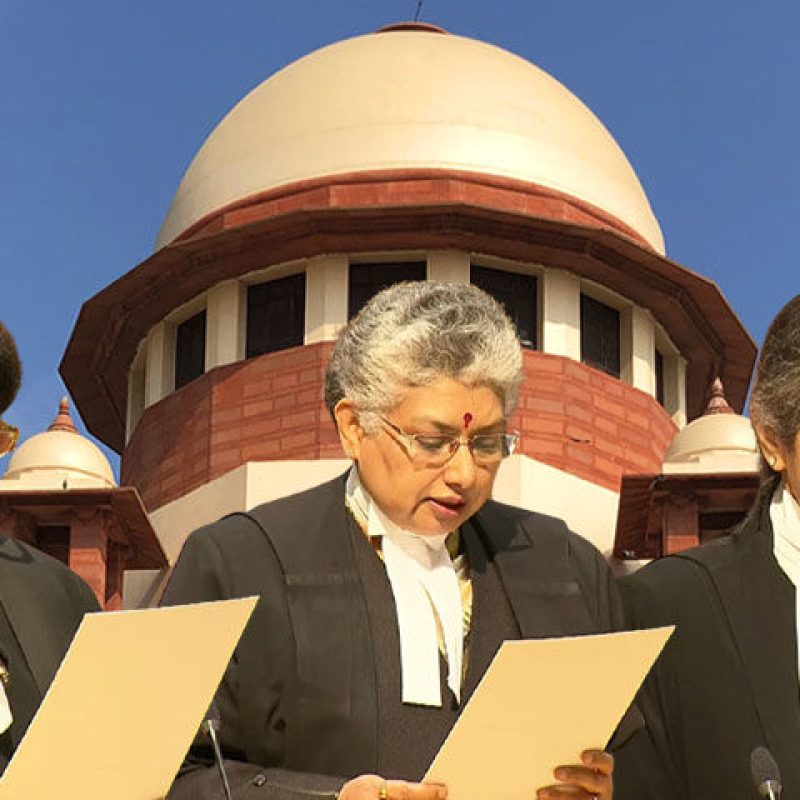It came as a moment of delight to everyone when the Supreme Court Collegium recommended the appointment of 3 women judges. This Collegium was presided by Chief Justice N V Ramana. It recommended a total of nine judges to be appointed in the Supreme Court.
Talking about the participation of women or, more precisely, the presence of women in the apex judicial body of India as judges, the number is unfortunately very low. Till this announcement, the Supreme Court had only one woman, Justice Indira Banerjee as the serving judge. She served in the Madras High Court as the chief justice and then on 7th August 2018; she entered the Supreme Court.
Taking the number of the serving women judges above one, three women have taken the oath in Supreme Court on Tuesday. The Supreme Court of India came into existence on 26th January 1950. Since then, the country has witnessed the appointment of very few women judges. Beginning from the induction of M Fathima Beevi in 1989, only eight women judges have taken oaths as justices in the Supreme Court.
Fathima Beevi was not only the first female judge to serve in the apex court, but she has also served as the governor of Tamil Nadu. Additionally, she was the first woman from the Muslim community to gain a position in the higher judiciary.
The governor of Kerala, Arif Mohammad Khan, praises her achievements as he says, “She is the first female judge in the Supreme Court. She is an inspiration to many, specially girls and women. She was also a governor.”
Other women judges were Sujata Manohar, Ruma Pal, Gyan Sudha Misra, Ranjana Desai, R. Banumathi, Indu Malhotra and the current female judge, Indira Banerjee.
Meet the 3 Women Judges: Justices Hima Kohli, BV Nagarathna and Bela M Trivedi
On Tuesday, the Chief Justice of India, N.V. Ramana headed the oath of allegiance to the Constitution to nine newly appointed judges of the apex court. This event is getting all the right praises from people across the country. Rightly so, because it’s the first time when our country has seen the induction of nine judges at once. Out of nine, three justices are women. Thus, the number of women judges have gone up in the Supreme Court.
Read about the 3 women judges
Justice Hima Kohli has earlier served as the Chief Justice of Telangana High Court. She is retiring in just two days after her appointment as Supreme Court judge.
Born on 2nd September 1959 in Delhi, Justice Kohli completed her graduation in History (Hons.) from St. Stephens College, University of Delhi. She then joined the Law Faculty, Campus Law Centre, University of Delhi. Thereby, getting enrolled as an advocate with the Bar Council of Delhi, 1984.
When COVID-19 patients from neighbouring states were denied medical aid in Telangana; Justice Hima Kohli stated, “This is a blatant violation of the Constitution. You are denying medical treatment to people. You are stopping people from entering without any official Order and without letting the public know? Who permitted you to do this?”
She slammed the authorities for their negligent behaviour.
Justice B.V. Nagarathna was born on 30th October 1962. Her father was the former Chief Justice of India, Justice E.S. Venkataramiah. She is a graduate of Jesus and Mary College, Delhi University. Then she completed her Law at Campus Law Centre, New Delhi.
Justice Nagarathna began her practice in 1987 in KESVY and Co. under Barrister Vasudev Reddy and Senior Advocate G.V. Shantharaju. Notably, she also started her independent chamber in 1994 till she got elevated as a judge by 2008.
Justice Nagarathna is a practitioner of diverse areas such as arbitration, land acquisition, administrative law, service law, family law, constitutional law, commercial law among others in the Supreme Court and several High Courts as well as trial courts. She can become the first-ever woman Chief Justice of India in the year 2027.
Justice Bela M. Trivedi is the first woman judge to be appointed in the Supreme Court from Gujarat High Court. She was born in June 1960. Justice Trivedi has previously worked in the subordinate judiciary as a Civil and Sessions Judge.
More importantly, she served as the Additional Judge in both Gujarat and Rajasthan High Courts and also as Law Secretary to the Gujarat government.
During her tenure as High Court judge, Justice Trivedi had recently slammed the Gujarat government for citing democracy as the reason behind the improper implementation of COVID-19 measures.
Justice Trivedi sharply remarks, “In the name of democracy, we cross all lines, everything is pardoned.”
This would remain as a landmark decision in the history of India.

